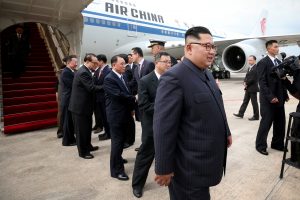By Hyonhee Shin
SEOUL (Reuters) – North Korea has produced a film on leader Kim Jong Un’s summit meeting with President Donald Trump this week, feeding, as one would expect, a fervid cult of personality but also seemingly highlighting his dream of economic development.
The 42-minute film, titled “Epochal meeting that pioneered new history between the Democratic People’s Republic of Korea and the United States”, aired on North Korean state television on Thursday.
It shows the highlights of Kim’s three-day trip to the city-state of Singapore, including exchanges during his historic summit with Trump on Tuesday, and visits he made to some of Singapore’s top sites that evening.
Rigidly controlled North Korean state media usually give ordinary people little exposure to the affluence of their Asian neighbors.
For years, media have relentlessly extolled the successes of their state, and its leaders from the Kim family, proudly defying the evil United States and its lackey allies, even as many ordinary North Koreans starved.
But this film lavished praise on prosperous, capitalist Singapore, lauding the “clean, beautiful and advanced” nation and suggesting it had lessons to offer.
“Our comrade supreme leader said he is eager to learn the excellent knowledge and experiences in various fields from your country,” the state media presenter cited Kim as telling Singapore officials.
Kim was briefed on urban planning and lauded the island nation’s “world-class” cargo-handling capacity, as well as its well-equipped ports and its economy.
One analyst said the film was underscoring Kim’s stated pledge to make the economy a priority, after he had announced the achievement of a long-held ambition to develop nuclear weapons.

North Korean leader Kim Jong Un arrives in Singapore, June 10, 2018 in this picture obtained from social media. Singapore’s Ministry of Communications and Information via REUTERS
MESSAGE OF HOPE?
Kim shifted his focus at a ruling party congress in April, abandoning the parallel pursuit of nuclear weapons and economic development he had expounded since taking power in 2011, to focus instead exclusively on development.
“It’s to give the message that ‘We could be as rich if we develop the market economy’,” Ahn Chan-il, a North Korean defector who now runs a Seoul-based think-tank, said of the film’s message.
“Ordinary North Koreans might feel some discontent for now, seeing Kim and his aides enjoying overseas travel when they’re struggling to feed themselves, but this film could give them hope at the same time.”
The film made much of Kim’s surprise evening outing to some of Singapore’s most famous waterfront sites, among them a rooftop bar and infinity swimming pool at one of its plushest hotels, where surprised guests filmed him with camera phones.
In one scene, Kim’s sister, Kim Yo Jong, was seen walking with him along a promenade, clearly impressed with the high-rise skyline.
Inevitably, Kim is portrayed in the film as a global peacemaker, sitting and smiling as an equal with the U.S. president derided just months earlier by state media as a “lunatic old man”.
Trump, accompanied by Kim, was shown returning the salute of Defence Minister No Kwang Chol, who was clad in his military uniform, raising questions among Trump’s critics back home.
The film also showed Trump offering Kim a peek inside the U.S. presidential limousine, known as “The Beast,” calling it a gesture of “special respect and goodwill”.
Such images reflected a new confidence in the North Korean leadership that the isolation was over and they had at last been accepted as legitimate members of the international community.
But the message could confound some ordinary North Koreans, said a South Korean official.
“It was recognition that North Korea has really craved, but it might also be a double-edged sword for Kim,” said the official, who declined to be identified because of the sensitivity of the matter.
“Imagine how perplexed ordinary North Koreans could be by the image of the evil United States so deeply rooted in their minds, and then this sudden mood of a thaw.”
(Reporting by Hyonhee Shin; Additional reporting by Ju-min Park and Jeongmin Kim; Editing by Robert Birsel)
 U.S. President Donald Trump and North Korean leader Kim Jong Un walk after lunch at the Capella Hotel on Sentosa island in Singapore June 12, 2018. REUTERS/Jonathan Ernst
U.S. President Donald Trump and North Korean leader Kim Jong Un walk after lunch at the Capella Hotel on Sentosa island in Singapore June 12, 2018. REUTERS/Jonathan Ernst
